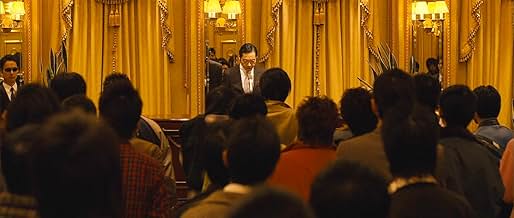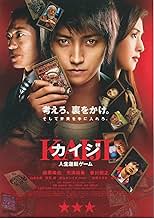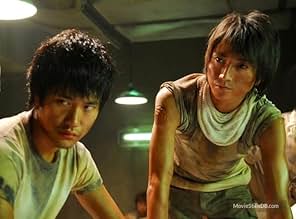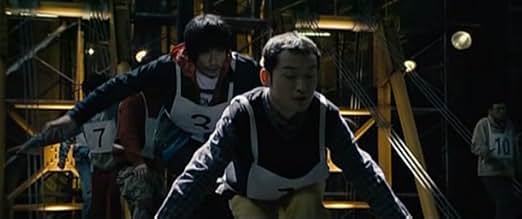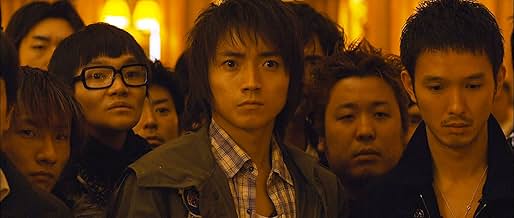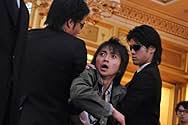Kaiji: Jinsei gyakuten gêmu
- 2009
- 2h 10min
Kaiji, un jeune joueur constamment endetté, se lance dans une compétition de jeux d'argent mortelle afin d'effacer ses prêts.Kaiji, un jeune joueur constamment endetté, se lance dans une compétition de jeux d'argent mortelle afin d'effacer ses prêts.Kaiji, un jeune joueur constamment endetté, se lance dans une compétition de jeux d'argent mortelle afin d'effacer ses prêts.
Histoire
Le saviez-vous
- AnecdotesNobuyuki Fukumoto, creator of the "Kaiji" manga on which this film is based, appears in the film as a black-suited man.
- Citations
Yukio Tonegawa: A Slave... why? Didn't you swap it before the blood sprayed on it?
Kaiji Ito: Sorry, but no. All I did was pull the face down Citizen and Slave cards close to me, then put a Citizen card over one, only to pull it back. In other words, I only pretended to swap.
Rinko Endo: He didn't swap them?
Yukio Tonegawa: Impossible! HOW COULD THIS BE POSSIBLE? WHY, WHY DIDN'T YOU SWAP THEM?
Kaiji Ito: That's easy. Because I had faith.
Yukio Tonegawa: Faith?
Kaiji Ito: Clearly, you're brilliant. Out of anyone I've ever met, you have the sharpest mind.
[holds up a blood-stained card]
Kaiji Ito: A man like you... would never fail to notice this blood. Of course you'd notice. And when you do, you'd be suspicious. You'd scrutinize it, realize it's a scheme and see through my plan.
[slams the card down on the table]
Kaiji Ito: YOU HAVE TO, BECAUSE YOU'RE SMART! That's why you'd be suspicious, and would recall how I'd swapped cards on the ship, and that I had the chance here. Then you'd snicker... how foolish I am. You'd be completely convinced. And why not? After all, your opponent is trash compared to someone like you. TRASH! You'd gloat. Because you're superior. NO TRASH HAS EVER COME CLOSE TO BEATING YOU. SO I USED YOUR ARROGANT SUPERIORITY AGAINST YOU! AND THIS PATHETIC SLAVE BEAT YOU!
- Crédits fousThe Nippon Television Network Corporation logo is accompanied by a ghoulish chant of "zawa".
- ConnexionsFollowed by Kaiji 2: Jinsei dakkai gêmu (2011)
- Bandes originalesIt's All Too Much
Performed by Yui
However, the strength of the film is how it metaphorically paints the picture of society with that rich-poor divide, between the elite class and those who are perpetual losers, being dealt the shortest end of the stick in life. It's easy to be on one side of the fence and accuse the other of being stupid, lazy and not worthy of their lot, but put it this way, who doesn't want to be able to live a financially free life with nary a material care since it's all taken care of. One thing in life that's constant, besides change, is that life is never fair, and usually being somebody, or knowing somebody else, may open some doors for you, making it a tad easier to get to one's objectives. The playing field is rarely even, and only made worse if one group decides to exploit the other.
Tatsuya Fujiwara plays the titular role Kaiji, a down and out young adult who's living his life without much aim, being painted an illusion by Endo (Yuki Amami) who had conned him into boarding a ship, on the hopes that by playing a game onboard would change his debt- ridden life as it is. It's a life-changing experience alright, one that Kaiji soon finds himself stuck in, being held against his wishes but on a principle that he made, and then sucked into an underground social system which is aimed squarely at how we, the workers, get bordered into a routine of work-rest-eat-drink, and a financial system that's basically out to regain every penny of reward given for honest work, and that's in the form of induced consumerism.
And that's how I suppose the rich and powerful can keep a stranglehold on the common folk, keeping them in despair until they resign to their "fate" that there's no way out of the vicious circle, and to conform and continue in their routine so as to fuel the economy. With each revelation comes Kaiji's resolve to get out of the system, only to find more obstacles in his way, becoming mere pawns of entertainment to the idle rich folks, one of whom is the chairman of a powerful conglomerate known as "Teiai" (or Love Emperor, played by Kei Sato).
The key entertaining moments in the film are of course the death-defying situations the gamblers are put through, and it turns out more to be like problem-solving coupled with going up against stacked odds. Fans of Kenichi Matsuyama will also be pleased that their idol had gotten a supporting role here looking quite rugged with his unshaven look, and instead of being at loggerheads with Fujiwara's Kaiji, it's a welcome change to see the two actors in roles that require support from each other. Teruyuki Kagawa (of Tokyo Sonata) also shines as the main over-confident villain in the film, whose bright idea it was to capture idling youths and to put them to work as slaves for Teiai, only to find himself setting up an adversary in Kaiji, adding to his reputation of not being well-liked.
Since it's adapted from the manga, the three key gambling moments were drawn from the books, although they come with minor tweaks to allow for a cinematic interpretation. Amongst the three games of Restricted Rock Paper Scissors, Human Derby and E-Card, which is an interesting game of chance involving Citizen, Emperor and Slave cards, director Toya Sato (who also helmed Gokusen the Movie) should be given credit for crafting the games and heightening tensions in an order of a crescendo befitting of a grand hurrah, striking a balance between the need to entertain, and to tickle that mind of yours in a battle of wits. There's a certain formula employed as well, with everything explained toward the end in a series of flashbacks, so yeah, the answers will be given after you exercised that noodle a little.
In some ways, the games were played in a fashion similar to how Jigsaw designed his. With the latter, the games serve as a lesson to those who had lived the good life, to teach them to be contented with their lot and not take life for granted. With this, it's in a way to break the barrier of zero confidence amongst those who are deemed losers in life, giving them monetary incentives to participate in death-defying games, in order to make them realize that through hard work and surpassing what is deemed impossible, will the survivors know that reward only comes from performance. Sounds a little like our workfare scheme, minus the death elements.
Like any manga inspired or movie adapted from graphic novels, the film barely scratched the surface of its rich origin material. As such, do keep your eyes peeled for a sequel currently scheduled for a 2011 debut. Expect more death-defying games, battle of wits, and a caution to those who are too smart for their own good, and if those elements in a film are your cup of tea then you shouldn't miss this!
- DICK STEEL
- 12 mars 2010
- Permalien
Meilleurs choix
- How long is Kaiji: The Ultimate Gambler?Alimenté par Alexa
Détails
- Date de sortie
- Pays d’origine
- Site officiel
- Langue
- Aussi connu sous le nom de
- Kaiji: The Ultimate Gambler
- Lieux de tournage
- Sociétés de production
- Voir plus de crédits d'entreprise sur IMDbPro
Box-office
- Montant brut mondial
- 24 709 016 $US
- Durée2 heures 10 minutes
- Couleur
- Mixage
- Rapport de forme
- 2.35 : 1
Contribuer à cette page



